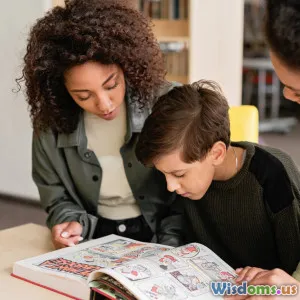
Essential Skills for Modern Education
8 min read Discover the essential skills shaping modern education and how they empower learners for future success. (0 Reviews)
Essential Skills for Modern Education
In today's rapidly evolving world, education is undergoing transformative changes, driven by technological advancements and shifting societal needs. The traditional model of rote learning and memorization no longer equips students with the tools necessary to thrive in a complex, digital era. Instead, modern education demands a robust set of skills that prepare learners not only to acquire knowledge but to apply it creatively, think critically, collaborate effectively, and adapt to continuous change.
This article delves into the essential skills that define modern education. Understanding these can inspire educators, parents, and learners to embrace a holistic educational approach that nurtures well-rounded, future-ready individuals.
Critical Thinking and Problem Solving
Critical thinking is arguably the cornerstone of modern education. In a world flooded with information, the ability to analyze content, assess its credibility, identify biases, and make informed decisions is invaluable. For example, according to a 2022 study by the World Economic Forum, 85% of jobs requiring higher education emphasize problem-solving and analytical skills over memorization.
Teaching critical thinking involves encouraging students to question assumptions, synthesize knowledge from various disciplines, and approach problems from multiple angles. Techniques like Socratic questioning, case studies, and project-based learning foster this skill in classrooms. For instance, some schools now incorporate 'design thinking workshops,' where students tackle real-world problems—from environmental issues to urban planning—promoting an applied understanding of theoretical concepts.
Digital Literacy and Technological Proficiency
Digital literacy extends far beyond basic computer skills; it encompasses the competency to navigate, critically evaluate, and create information using digital technologies. The COVID-19 pandemic highlighted how integral digital fluency is, with remote learning becoming a necessity and online collaboration tools like Zoom and Google Classroom becoming ubiquitous.
Experts note that digital skills are no longer optional but fundamental. The European Commission’s Digital Economy and Society Index emphasizes that at least 90% of jobs now require some level of digital proficiency. Moreover, emerging technologies—such as artificial intelligence, data analytics, and virtual reality—are increasingly integrated into learning environments.
Implementing coding classes from early education stages, encouraging multimedia content creation, and teaching cybersecurity awareness are practical ways to enhance digital literacy. For example, Estonia’s education system, recognized globally for digital innovation, integrates programming into the national curriculum from primary school, preparing students for a digital future.
Communication and Collaboration
The ability to convey ideas clearly and work effectively with others remains essential in modern education and beyond. Whether collaborating on group assignments, participating in debates, or engaging in peer review, these skills underpin success in academic and professional contexts.
According to LinkedIn’s 2023 Workplace Learning Report, communication and collaboration consistently rank among the top soft skills sought by employers. To cultivate these skills, classrooms are increasingly adopting team-based projects, peer-teaching practices, and discussion forums that mirror real-world workplace dynamics.
For example, the Singaporean education system promotes collaborative learning through their 'Collaborative Problem Solving' framework, emphasizing interdependence, shared responsibility, and conflict resolution—all crucial competencies for 21st-century learners.
Adaptability and Lifelong Learning
The rapid pace of change in technology, work environments, and societal expectations calls for learners who are adaptable and committed to ongoing self-improvement. Lifelong learning—the continuous pursuit of knowledge and skills—has become a vital mindset.
Research by the OECD reveals that individuals with a growth mindset and adaptability have better employment prospects and job satisfaction as they navigate multiple career shifts across their lifetimes. Cultivating these qualities in education means encouraging curiosity, resilience, and openness to new experiences.
Institutes like Finland’s educational system emphasize “phenomenon-based learning,” where students explore interdisciplinary themes, promoting adaptability by requiring them to apply knowledge flexibly. Additionally, integrating reflection exercises and goal-setting activities can guide students in taking ownership of their learning journeys.
Emotional Intelligence and Social Skills
Beyond cognitive abilities, emotional intelligence (EQ), including self-awareness, empathy, and interpersonal skills, is gaining recognition as a critical educational goal. High EQ helps students manage stress, communicate effectively, and develop positive relationships—skills vital for both personal well-being and professional success.
Psychologist Daniel Goleman highlights EQ’s role in leadership, workplace collaboration, and academic achievement, suggesting its integration into curricula can enhance student outcomes. Schools are adopting programs such as Social and Emotional Learning (SEL) to systematically nurture these competencies.
Examples include mindfulness practices, peer mediation initiatives, and conflict resolution workshops. Research by the Collaborative for Academic, Social, and Emotional Learning (CASEL) shows that SEL programs can improve academic performance by approximately 11%, alongside reducing behavioral issues.
Cultural Awareness and Global Competence
Globalization has interconnected societies, making cultural awareness and the ability to engage meaningfully across diverse cultures essential. Modern education encourages understanding global issues, respecting differences, and participating in a multicultural world.
International programs like the International Baccalaureate (IB) place high value on intercultural understanding and foster global citizenship through community service, language learning, and discussions on world affairs. UNESCO advocates for global competence as a key skill ensuring students are prepared for sustainable development challenges.
By incorporating multicultural resources, foreign languages, and exchange programs, educators nurture students’ abilities to collaborate and innovate across cultural boundaries, thus enriching their educational experience and future careers.
Conclusion
As education evolves, the focus shifts from mere content acquisition toward nurturing a comprehensive skill set that prepares learners for an uncertain, dynamic future. Critical thinking, digital literacy, communication, adaptability, emotional intelligence, and cultural awareness form the foundation of modern education.
Embracing these skills doesn't just aid in academic achievement; it propels students toward success in life and work, empowering them to be creative problem solvers, effective collaborators, and empathetic global citizens.
Educators, parents, and policymakers must recognize and integrate these essential skills systematically. By doing so, we can cultivate a generation equipped to face complex challenges with confidence and ingenuity—transforming the future of education to match the demands of an ever-changing world.
Rate the Post
User Reviews
Popular Posts





















